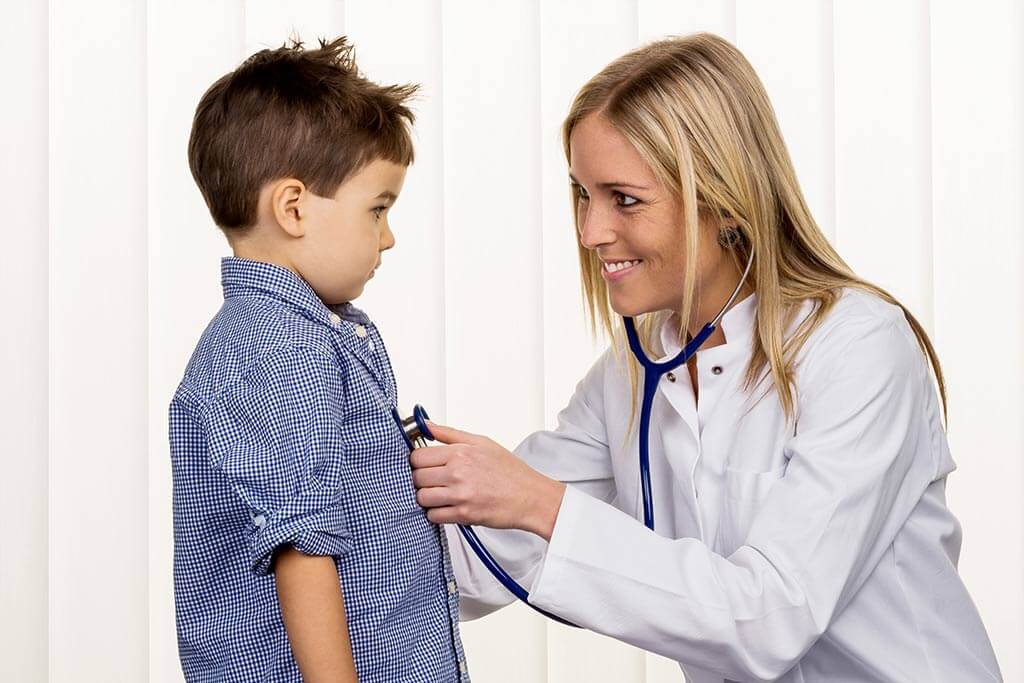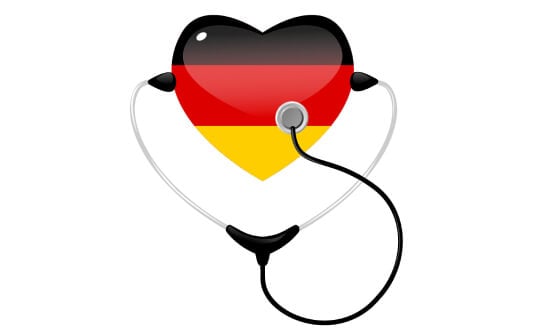Tetralogy of Fallot (ToF) is the type of congenital heart disease diagnosed in up to 3 of 10,000 newborns. The pathology may be detected even before the birth by means of expert fetal echocardiography. The abnormal structure of the heart and major vessels hampers a child’s physical activity and normal physical growth and development. Specialized European clinics offer reconstructive cardiac surgeries for children and adults and maintenance pharmacotherapy and rehabilitation. A timely operation performed by an experienced cardiac surgeon guarantees excellent survival and good long-term results.
Content
- What happens in people with tetralogy of Fallot (why do we need to treat it)
- Treatment measures in children
- Treatment measures in adults
- Benefits of cardiac surgery in German hospitals
- Choosing a hospital and estimating treatment costs
- Complex cardiac surgery abroad with Booking Health
What happens in people with tetralogy of Fallot (why do we need to treat it)
ToF stays in the focus of clinical attention, as it is the most widespread form of the congenital heart disease with an incidence of 0.34 per 1000 newborns (worldwide data). In children with the tetralogy of Fallot, there are several malformations of the heart and neighboring great vessels:
- Stenosis of the pulmonary artery that carries oxygen-poor blood from the right ventricle of the heart to the lungs
- Hypertrophy of the right ventricle that has to force blood through the narrowed pulmonary artery
- Ventricular septal defect, so that oxygen-poor blood can move freely from the right ventricle of the heart to the left one (normally, the left ventricle contains only oxygen-rich blood)
- Dextroposition of the aorta or overriding aorta, so that it starts from the middle of the heart ventricles (normally, the aorta comes off the left ventricle of the heart and carries oxygen-rich blood from the heart to all tissues and organs)
Such structure of the heart, aorta and pulmonary artery leads to poor oxygenation of organs and development of disturbing symptoms, like
- Bluish skin color during the attack
- Loss of consciousness during the attack
- Shortness of breath during physical exertion or feeding
- Rapid fatigability during play or other physical exertion
- Poor weight gaining
- Developmental delays, including the physical, emotional or mental ones
- Clubbed fingers
Infants often experience "blue" or "tet" spells that are paroxysmal hypercyanotic attacks. Unlike toddlers and older children, they cannot alleviate symptoms by squatting. An infant becomes cyanotic, gasps for air, and does not respond to the parent’s voices. This is a life-threatening condition.
As for the less severe symptoms, they not only influence the quality of life but also affect a child’s further psycho-emotional development and physical growth. Thus, timely reestablishing of physiological blood flow is essential.
Treatment measures in children
Treatment of tetralogy of Fallot in children include three groups of methods:
- Pharmacotherapy in newborns with severe symptoms. In newborns with severe cyanosis, doctors administer infusions of prostaglandin E1. Administered in the dose of 0.05-0.1 mcg/kg/min intravenously, prostaglandin E1 stimulates ductus arteriosus opening and thereby increases the pulmonary blood flow.
- Symptomatic physical measures in older children. A parent or a healthcare professional presses the child’s knees to his chest (or a child squats spontaneously), calms him down and provides free access to oxygen (from the air or oxygen mask).
- Surgical treatment is the only curative measure that eliminates the root cause of the disease. It may be performed as a single-stage procedure or include several consecutive interventions.
The single-stage intracardiac repair is typically performed between 3 and 6 months. It consists of repairing the septal defect between the left and right ventricles along with restoring normal blood flow through the pulmonary artery. In case a child has pulmonary atresia, the intervention also includes connecting the right ventricle to the lung artery.
It is preferable to apply a staged approach in certain clinical situations. This allows for improving a child’s general condition before the intracardiac repair. The initial surgery is a Blalock-Taussig shunt (BT shunt). BT shunt procedure implies creating the connection between the thoracic artery and the lung artery. This increases the flow of oxygen-poor blood to the lungs and, thus, improves blood oxygenation.
Treatment measures in adults
As for the older patients that have not undergone surgery while being a child, they still have options of pharmacotherapy for symptoms alleviation and surgical correction of the defect.
Pharmacotherapy is a symptomatic treatment. It is aimed at:
- Reducing hypertrophy of the right ventricle
- Improving blood circulation in the lungs
- Controlling circulating fluid volume, and edema prevention
In adults, more pharmacological agents can be applied, including the following ones.
Vasodilators. Vasodilators allow blood to flow more freely from the heart to the systemic vessels. This facilitates the work of the heart ventricles and improves cardiac output. The most commonly used vasodilator is prostaglandin E1 (alprostadil).
Diuretics. Diuretics decrease circulating blood volume and concomitant risks of edema development by diuresis stimulation. Loop diuretics, namely furosemide, are also used for the symptomatic treatment of congestive heart failure.
Alpha-1 -agonists. Alpha-1 -agonists increase heart rate and myocardial contractility. Resulting in better cardiac output and higher systemic blood pressure, alpha-1 -agonists improve oxygen delivery to organs and tissues. One of the most efficient drugs from this pharmacological group is phenylephrine.
Analgesics. Analgesics are used during the hypercyanotic episodes for pain control and psycho-emotional management. Severe episodes require intravenous administration of morphine sulfate. Predictable effects and a good safety profile of the medication make it the drug of choice.
Talking about curative or partial surgeries, adults can undergo the same operations as children. The main difference is adults have a smaller reserve of cardiac stem cells. Thus, the regeneration of myocardium, endocardium, and major vessels in adults is worse than in children. Postoperative recovery may be longer and result in comparatively worse functional outcomes.
Benefits of cardiac surgery in German hospitals
For the objective appraisal of the success rates in the field of cardiac surgery, the German Society for Thoracic and Cardiovascular Surgery has founded the respective registry. It includes data on all heart surgeries performed in 78 German specialized centers and heart surgery departments. The summarized data for 2018 demonstrates a 97.1% survival rate, which is quite impressive. Cardiosurgery in Germany is based on the following principles:
- The high-quality preoperative medical examination that allows for revealing concomitant medical conditions. This is essential in children with genetic disorders when tetralogy of Fallot may be accompanied by DiGeorge syndrome or pulmonary pathology.
- Safe anesthetic. In children, a general anesthetic must ensure proper sedation and analgesia along with the absence of withdrawal symptoms or hemodynamic changes. The optimal medicine for the perioperative period is dexmedetomidine. Other options include intravenous acetaminophen and propofol.
- Preference for endovascular and minimally invasive interventions. Beyond all doubt, complex heart reconstruction requires an open surgical approach and a wide surgical field. Often, two or three surgeons are involved in one procedure. Nevertheless, initial surgeries (like the Blalock-Taussig shunt) may be performed through a minimally invasive approach.
- Using reliable vascular prostheses, if any are required. In most cases, the patient’s tissues are sufficient for the heart reshaping. Otherwise, a surgeon uses certified synthetic prostheses.
- Considering the aesthetic aspect. Regardless of a patient’s age, German surgeons take care to avoid large hypertrophic scars on the chest.
- Thorough post-operative monitoring. Patients spend up to 24 hours of the early postoperative period in the intensive care unit. This ensures constant monitoring of vital signs and timely response to their significant changes.
- Detailed recommendations regarding the follow-up examinations and rehabilitation. The surgical medical treatment in Germany is always followed by postoperative rehabilitation and continuous maintenance pharmacotherapy. Provided by trained healthcare professionals, cardiological rehabilitation facilitates postoperative functional recovery and proper further development of the cardiovascular system. Regular medical check-ups include laboratory (blood test, coagulogram, etc.) and instrumental (ECG, EchoCG, etc.) tests and provide the doctor with objective information about the state of the heart.
The updated annual registry of the German Society for Thoracic and Cardiovascular Surgery represents current success rates and serves as the independent basis for quality management, i.e., all healthcare facilities strive to reach better indicators.
Choosing a hospital and estimating treatment costs
Treatment of tetralogy of Fallot requires the joint work of cardiologists, cardiac surgeons, general practitioners, and rehabilitation specialists. Large university hospitals offer the best treatment for this heart defect:
- University Hospital Oldenburg, Department of Cardiac Surgery
- University Hospital Essen, Department of Cardiothoracic Surgery
- University Hospital Ulm, Department of Cardiothoracic Surgery
- University Hospital Frankfurt am Main, Department of Cardiothoracic Surgery
- University Hospital Tuebingen, Department of Adult and Pediatric Cardiothoracic Surgery
The estimated costs of examination and treatment are as follows:
| Average price | |
|---|---|
| Examination for suspected tetralogy of Fallot | €2,630 |
| Radical surgical treatment for tetralogy of Fallot | €60,770 |
| Cardiac rehabilitation after the surgery | €1040 per day |
The total cost of the medical program is determined based on the results of the examination. The price depends on the duration of inpatient treatment, the presence of concomitant diseases, and other factors.
Complex cardiac surgery abroad with Booking Health
Choosing a healthcare facility and expert in cardiac surgery may be a complicated task for a person without relevant experience or clinical medical knowledge. Treatment of toddlers requires special attention, as only a few hospitals have equipment for complex pediatric interventions. Most of these hospitals are located in Germany.
Experts of the medical tourism provider Booking Health offer all-inclusive assistance with choosing the healthcare facility and doctor, preparing for the trip, undergoing surgery, and arranging follow-up procedures. The list of Booking Health services includes but not limited to:
- Choosing proper hospital based on the annual qualification profile (cardiology, cardiac surgery, children's health)
- Establishing the preliminary communication with your cardiologist and surgeon
- Booking the appointment or room in the cardiologic department
- Preparing the preliminary treatment program (without repeating previous diagnostic tests) and explaining its stages
- Providing favorable cost for treatment and relevant services, excluding additional fees (saving up to 50%)
- Independent external monitoring of all medical interventions
- Insurance against the cost of program increase in case of complications (200,000 EUR, valid for 4 years)
- Help in purchasing and forwarding medicines, if necessary
- Communication with the hospital and doctor after treatment completion
- Control of bills and return of unspent funds
- Organization of rehabilitation, follow-up tests, maintenance therapy
- Offering travel service of the highest level: booking plane tickets and hotels, transfer organization, services of interpreter
To start planning your treatment or treatment of your child, please, leave the request on the Booking Health website. A patient case manager or medical advisor will contact you ASAP so that you will discuss all the details. The main aim of Booking Health is to help you with improving and maintain your well-being.
Choose treatment abroad and you will for sure get the best results!
Authors:
The article was edited by medical experts, board certified doctors Dr. Vadim Zhiliuk, Dr. Nadezhda Ivanisova. For the treatment of the conditions referred to in the article, you must consult a doctor; the information in the article is not intended for self-medication!
Sources:
Read:
Why Booking Health - questions and answers
How to make right decision when choosing the clinic and specialist
7 reasons to trust to the rating of clinics on the Booking Health portal
Don't know where to start?
Contact Booking Health







